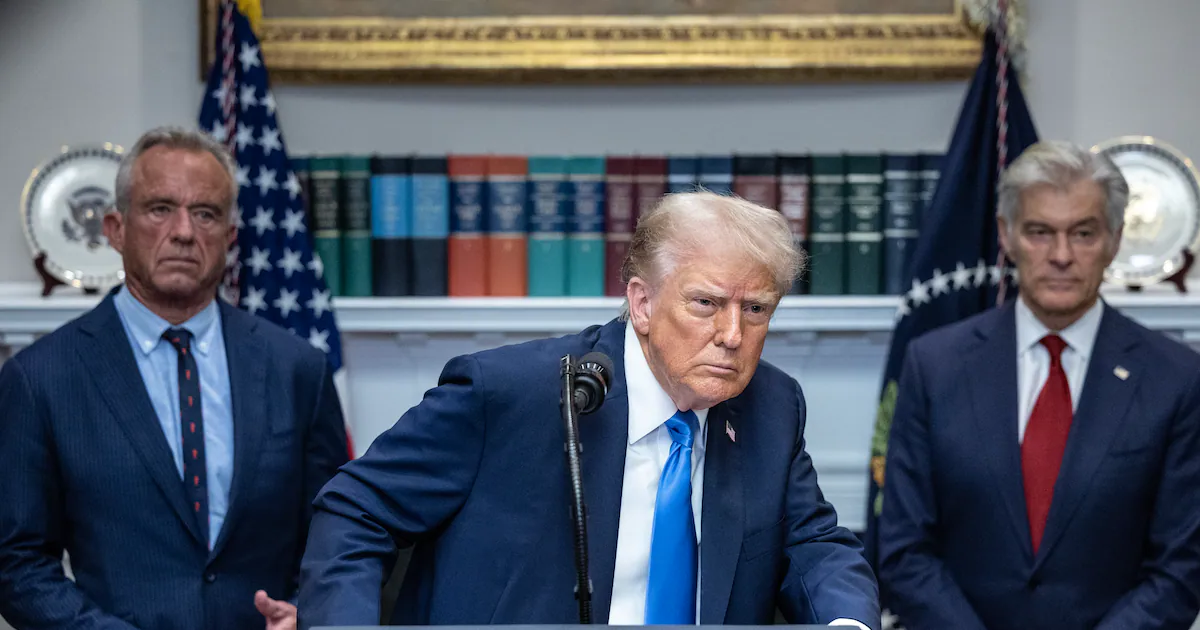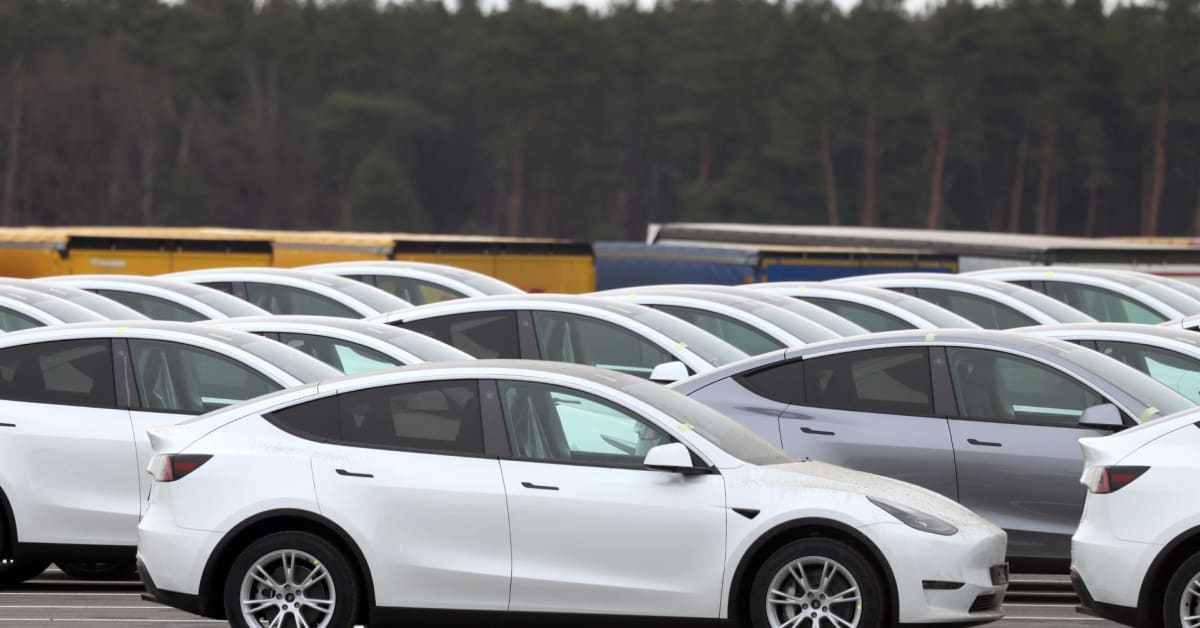
Public health experts were already on edge when President Donald Trump strode to a White House lectern Monday, promising to reveal new answers about autism.
But few were expecting the president’s direct attack on vaccines – a prolonged riff that shocked medical leaders, alarmed some current and former Trump officials and unsettled Republican allies on Capitol Hill, as the president repeated false claims about vaccine safety and called for changes to the childhood immunization schedule.
“This is based on what I feel,” Trump said at one point, a recurring refrain in his often ad-libbed remarks. The president called for an end to one widely used combination childhood vaccine, insisted that it would be safer to delay another and urged parents to disregard long-standing federal recommendations on when to vaccinate their children in favor of spacing out shots over a multiyear period.
All of those arguments have long been espoused by anti-vaccine activists and criticized as harmful by many public health officials and pediatricians. Robert F. Kennedy Jr., who rose from anti-vaccine activist to Trump’s top health official, also called for an “honest look” at the debunked connection between autism and vaccines as he flanked the president at the news conference.
“That was the most dangerously irresponsible press conference in the realm of public health in American history,” said Paul Offit, a pediatrician and Children’s Hospital of Philadelphia vaccine researcher who has long sparred with anti-vaccine groups. “Here you have the president of the United States and his bully pulpit, you have the secretary of health and human services and his bully pulpit, both telling you that vaccines are basically causing chronic disorders.”
Trump’s remarks were the latest in his administration’s escalating embrace of anti-vaccine rhetoric – moves that have split the Republican Party, with several GOP senators urging the administration to preserve the existing federal recommendations on childhood vaccines. Fabrizio Ward, a prominent conservative polling firm, also cautioned that it would be “folly” to assume that Republican voters are against common childhood vaccines, citing data that about 8 in 10 adults believe it is important to receive the combination measles, mumps and rubella (or MMR) vaccine and the hepatitis B vaccine – two vaccines that Trump targeted in his news conference Monday.
The president has cast himself as broadly supportive of immunizations, recently questioning Florida’s move to end school vaccine requirements and calling himself a “big supporter of vaccines” Monday. The White House also defended Trump’s remarks, pointing to their broader initiative to seek answers about autism.
“Millions of parents across our country [have] been sidelined and ridiculed for merely asking questions about public health guidance,” spokesman Kush Desai said in a statement. “President Trump pledged to address skyrocketing rates of autism and other chronic conditions, and the Administration is leaving no stone unturned to deliver on this pledge.”
[Trump gave medical advice about Tylenol. Here’s what medical experts say.]
The Monday White House news conference was designed to focus on Tylenol as a potential cause of autism and the drug leucovorin as a potential treatment – despite the lack of definitive evidence for either. It initially appeared Trump and Kennedy would avoid blaming vaccines.
But in his rambling remarks, Trump called for the MMR vaccine to be given as separate shots; urged the delay of the hepatitis B birth dose until age 12; and urged parents to disregard the established childhood immunization schedule that targets vaccinations to when a child is most susceptible to disease, calling on parents to instead space out shots.
“They pump so much stuff into those beautiful little babies, it’s a disgrace,” Trump said.
A Washington Post-KFF poll on vaccine views this summer found 41 percent of U.S. parents think children are healthier when they don’t get multiple shots in one visit. But public health authorities and pediatricians have warned that delaying vaccines would mean children would not have immunity against diseases, such as polio and whooping cough, when they are most at risk.
Medical groups and immunization experts condemned Trump’s remarks.
“Today’s White House event on autism was filled with dangerous claims and misleading information that sends a confusing message to parents and expecting parents and does a disservice to autistic individuals,” Susan Kressly, president of the American Academy of Pediatrics, said in a statement.
Trump previewed his vaccine remarks with his health deputies before the news conference, according to a White House official who spoke on the condition of anonymity to describe internal discussions.
Several aides to Republican members of Congress, speaking on the condition of anonymity because they were not authorized to speak to the press, also said their offices were unsettled by Trump’s remarks, having already received constituents’ complaints about the administration’s vaccine policies. Two former Trump administration officials and one current official, who spoke on the condition of anonymity to be candid about the president, said they were deeply frustrated and worried about Trump’s decision to amplify anti-vaccine talking points.
Before the White House event, some anti-vaccine activists complained that too much attention would be focused on Tylenol and worried that Kennedy would back away from officially endorsing the claim of an autism-vaccine link from his newfound powerful perch in government.
But while Kennedy was relatively circumspect at the Monday news conference, and did not repeat some of his most controversial claims about vaccines, Trump delighted Kennedy’s allies as he repeatedly brought up anti-vaccine talking points, such as a discredited claim that Amish people neither get vaccinated nor develop autism.
Children’s Health Defense, an anti-vaccine group founded by Kennedy, posted on X that Trump “said the quiet part out loud” with his comments about Amish people and “held NOTHING back” by describing vaccines as linked to autism.
Some anti-vaccine activists welcomed Trump’s fixation on Tylenol and how he frequently lumped the medication and vaccines together as autism risk factors. Unlike the debunked vaccine connection, some research suggests an association between Tylenol use and autism, although researchers stress a causal relationship has not been established. Trump urged women not to take Tylenol during pregnancy and “tough it out” when sick, even though the new guidance from the Food and Drug Administration does not go as far and medical associations reaffirmed their guidelines that the medication is safe when used in consultation with a health care provider.
[The drug Trump plans to promote for autism shows real (and fragile) hope]
Children’s Health Defense has previously claimed that Tylenol weakens the immune system of young children and makes them more susceptible to vaccine injuries. Painkillers taken right before childhood vaccines could reduce the efficacy of those vaccines, rather than heighten any effects from immunization.
“The genius of starting with Tylenol is that it primes the pump so that people are talking about the mechanisms involved in autism causation and they are will learn beforehand HOW vaccines are causing autism not just THAT they are causing autism,” Ginger Taylor, an anti-vaccine activist and mother of an autistic child, posted on X in response to the news conference.
After the event, MAHA Action, an advocacy arm for Kennedy’s Make America Healthy Again movement, celebrated Trump’s vaccine comments in an X post, writing: “No President has ever addressed vaccines like this!”
Trump has previously expressed skepticism about some vaccines, stretching before his presidency and in stray comments as president. But public health experts said they were concerned about the dangers of spreading the misinformation from a White House lectern, echoing similar concerns in 2020 when Trump promoted hydroxychloroquine and suggested injecting disinfectant to fight covid.
The United States is experiencing its largest measles outbreak in more than 30 years, concentrated in a part of West Texas with below-average immunization rates. Public health experts have criticized Kennedy for offering a tepid endorsement for MMR vaccination while promoting alternative treatments and validating unfounded concerns about the vaccines.
“I’ve never heard a faster fire hose of rumors and falsehoods coming from the highest office of the nation – at the very same time measles cases are at some of the highest rates we’ve seen in decades,” said Katelyn Jetelina, a California epidemiologist who writes a weekly newsletter about public health and infectious diseases. “The two happening at the same time aren’t a coincidence.”
Trump described his support for splitting up the MMR vaccine as common sense. “I’m not a doctor, but I’m giving my opinion,” he said, later adding, “I’ve heard bad things about it for many years.”
The false claim that vaccines cause autism traces back to a retracted study in the late 1990s by a researcher who prompted separating the MMR vaccine as an alternative. Single vaccines are less safe than MMR because they leave children vulnerable to dangerous diseases for longer, according to public health authorities. Giving three separate doses at spaced-out intervals would mean that, after the first injection, the child still has no immunity to the other two diseases.
Separate shots of the MMR vaccines are not available in the United States.
Merck & Co., which makes the MMR vaccine, said in a statement that combination vaccines undergo rigorous testing just like individual vaccines, to ensure each component is as safe and effective as each of the individual vaccines given separately.
“We also support the quest for gold standard science and stand behind the safety of our vaccines,” Merck said.
Trump criticized the use of aluminum in vaccines as he vowed to remove metals from shots, a concern often cited by Kennedy. Aluminum is used in vaccines in a more soluble form to boost the body’s immune response, including for hepatitis B and diphtheria, tetanus and pertussis vaccines given to children. The ingredient has repeatedly been evaluated as a part of vaccines in clinical trials and administered in billions of doses over several decades.
A recently published Danish study analyzing data from more than 1 million children found no links between aluminum in vaccines and autism or other chronic conditions. Kennedy unsuccessfully sought for that study to be retracted.
– – –



